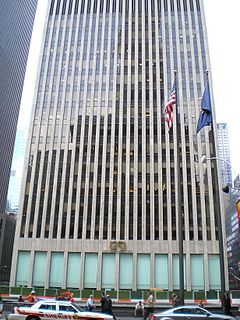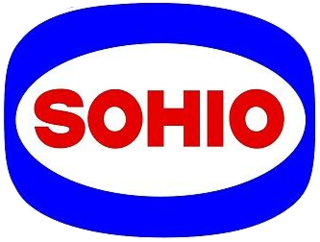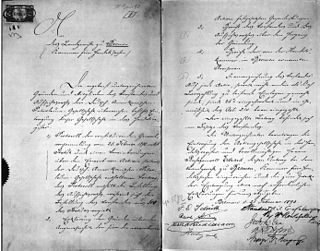
Exxon Corporation, formerly known as the Standard Oil Company of New Jersey until 1973, was an American oil company and descendant of Standard Oil which merged with Mobil to form ExxonMobil in 1999. Once one of the Seven Sisters that dominated the global petroleum industry, Exxon was one of the largest companies in the world, being one of the top five companies on Fortune 500 between the first edition of the list and the year of its merger with Mobil and reaching the #1 spot on the list a few years between 1970 and 1995.
Mobil Corporation was an American oil company that merged with Exxon in 1999 to form ExxonMobil. Prior to its merger with Exxon, Mobil was one of the Seven Sisters that dominated the global petroleum industry from the mid-1940s until the 1970s. As one of the 34 original companies to descend from the breakup of Standard Oil, Mobil was originally known as the Standard Oil Company of New York (Socony). Mobil credits itself with being the first company to introduce paying at the pump at its gas stations, as well as the first company to introduce a mobile payment device, today known as Speedpass.
Standard Oil Company, Inc., was an American oil production, transportation, refining, and marketing company that operated from 1870 to 1911. At its height, Standard Oil was the largest petroleum company in the world, and its success made its co-founder and chairman, John D. Rockefeller, one of the wealthiest Americans of all time and one of the richest people in modern history. Its history as one of the world's first and largest multinational corporations ended in 1911, when the U.S. Supreme Court ruled that it was an illegal monopoly.

Amoco is a brand of fuel stations operating in the eastern United States, and owned by British company BP since 1998. The "Amoco Corporation" was an American chemical and oil company, founded in 1889 around a refinery in Whiting, Indiana, and was officially the "Standard Oil Company of Indiana" until 1985. Originally part of the Standard Oil Trust, it focused on producing gasoline for the new automobile market. In 1911, as part of the break-up of the Standard Oil Trust, it became an independent corporation. Incorporated in Indiana, it was headquartered in Chicago, and formally adopted the name Amoco in 1985. Amoco merged operations with BP in 1998.

The Standard Oil Company (Ohio) was an American oil company, a successor of the original company established in 1870 by John D. Rockefeller. It was established as "Standard Oil Company of Ohio" as one of the separate entities created after the 1911 breakup.

Esso is a trading name for ExxonMobil. Originally, the name was primarily used by its predecessor Standard Oil of New Jersey after the breakup of the original Standard Oil company in 1911. The company adopted the name "Esso", to which the other Standard Oil companies would later object.

Chevron Corporation is an American multinational energy corporation. One of the successor companies of Standard Oil, it is headquartered in San Ramon, California, and active in more than 180 countries. Chevron is engaged in every aspect of the oil and natural gas industries, including hydrocarbon exploration and production; refining, marketing and transport; chemicals manufacturing and sales; and power generation. It was also one of the Seven Sisters that dominated the global petroleum industry from the mid-1940s to the 1970s.

Imperial Oil Limited is a Canadian petroleum company. It is Canada's second-biggest integrated oil company.It is majority owned by American oil company ExxonMobil with around 69.6 percent ownership stake in the company. It is a significant producer of crude oil, diluted bitumen and natural gas, Canada's major petroleum refiner, a key petrochemical producer and a national marketer with coast-to-coast supply and retail networks. It supplies Esso-brand service stations.

Bayway Refinery is a refining facility in the Port of New York and New Jersey, owned by Phillips 66. Located in Linden and Elizabeth, New Jersey, and bisected by Morses Creek, it is the northernmost refinery on the East Coast of the United States. The oil refinery converts crude oil into gasoline, diesel fuel, jet fuel, propane and heating oil. As of 2007, the facility processed approximately 238,000 bbl/d (37,800 m3/d) of crude oil, producing 145,000 bbl/d (23,100 m3/d) of gasoline and 110,000 bbl/d (17,000 m3/d) of distillates. Its products are delivered to East Coast customers via pipeline transport, barges, railcars and tank trucks.

On the Run is a flagship convenience store brand developed by ExxonMobil, used at Exxon and Mobil stations in the United States, BP and Mobil in Australia and at Esso and Mobil stations internationally. Couche-Tard acquired the On the Run trademark and franchise network in the U.S. in 2009, and Parkland Fuel did the same in Canada in 2016; ExxonMobil retains full ownership of the brand in the rest of the world.

Atlantic Petroleum was an oil company in the Eastern United States headquartered in Philadelphia, Pennsylvania, and a direct descendant of the Standard Oil Trust. It was also one of the companies that merged with Richfield Oil Corporation to form the "AtlanticRichfield Co.", later known as ARCO.

Humble Oil and Refining Co. was an American oil company founded in 1911 in Humble, Texas. In 1919, a 50% interest in Humble was acquired by Standard Oil of New Jersey which acquired the rest of the company in September 1959 and merged with its parent to become Exxon Corporation in 1973.
General Drafting Corporation of Convent Station, New Jersey, founded by Otto G. Lindberg in 1909, was one of the "Big Three" road map publishers in the United States from 1930 to 1970, along with H.M. Gousha and Rand McNally. Unlike the other two, General Drafting did not sell its maps to a variety of smaller customers, but was the exclusive publisher of maps for Standard Oil of New Jersey, later Esso and Exxon. They also published maps for Standard Oil Company of Kentucky a.k.a. KYSO. KYSO later merged with Standard Oil Company of California better known as Chevron and SOCAL primarily used The H.M. Gousha company for their roadmaps.
ExxonMobil Australia is an Australian affiliate of ExxonMobil, the US based oil giant. It operates a number of oil and gas platforms in Bass Strait, south east of Melbourne, Australia, as well as a gas processing facility at Longford and Long Island Point (LIP) in Hastings.

Petron Corporation is the largest oil refining and marketing company in the Philippines, supplying more than a third of the country's oil requirements. It operates a refinery in Limay, Bataan with a rated capacity of 180,000 barrels per day (29,000 m3/d). From the refinery, Petron moves its products mainly by sea to 32 depots and terminals throughout the country.
Exxon Mobil Corporation, stylized as ExxonMobil, is an American multinational oil and gas corporation headquartered in Irving, Texas. It is the largest direct descendant of John D. Rockefeller's Standard Oil, and was formed on November 30, 1999, by the merger of Exxon and Mobil. ExxonMobil's primary brands are Exxon, Mobil, Esso, and ExxonMobil Chemical, which produces plastic, synthetic rubber, and other chemical products. ExxonMobil is incorporated in New Jersey.

Enco was a secondary retail brand name for products of the Humble Oil Corporation in certain parts of the United States from 1960 to 1977. It was used on service stations operated by Humble in states where they were not permitted to use the Esso brand under conditions set by the court-ordered breakup of Standard Oil in 1911.

Gulf Oil LP is an American oil company formed when Chevron Corporation acquired the naming rights to the Gulf Oil brand in the United States for $13 billion in 1985.
Standard Oil may refer to:

Deutsch-Amerikanische Petroleum Gesellschaft, also known as German-American Petroleum Company, was a German petroleum company that was a subsidiary of Standard Oil and was founded in 1890. From 1950 onwards the company was called the Esso Deutschland GmbH and has been a subsidiary of the ExxonMobil group since 1999.


















